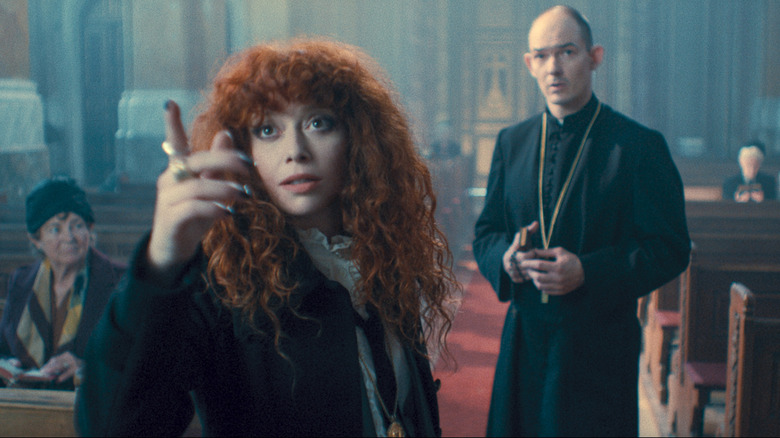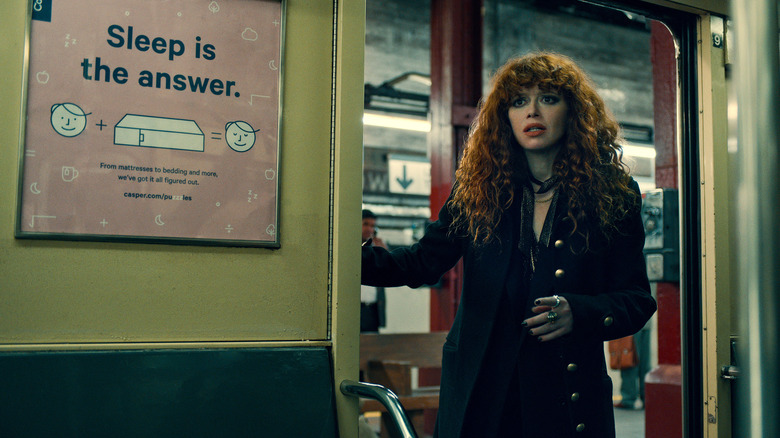Russian Doll Season 2 Review: Unstacking Generational Trauma Once More, With Feeling
The first season of "Russian Doll" was a riff on trauma therapy using a time loop, forcing its two protagonists to relive their pain in order to overcome it. Season 2 digs deeper, interrogating generational trauma through time travel. Our two heroes, Nadia (Natasha Lyonne) and Alan (Charlie Barnett), accidentally discover the ability to time-travel using a New York City landmark, and it forces them to reconcile more than just their own pasts.
The second season takes place four years after the events of season 1, with Nadia looking forward to (and dreading) her 40th birthday. Then, one day, she accidentally stumbles through the time portal into her distant past. The experience makes her think that she has unfinished business in the past that could possibly help her have a better present (oh wow, there's that trauma therapy allegory again), so she tells Alan about it and starts traveling in time even more in order to unravel the mystery of her history. What follows is an examination of generational trauma and how we pass down old wounds from parent to child. If the first season taught Nadia and Alan how to forgive themselves, season 2 gives them the empathy to forgive the people who impacted them most.
Nadia's surrogate mother figure, Ruth (Elizabeth Ashley), is a trauma therapist, and she tells Nadia during one episode, "Trauma is a topographical map written on the child, and it takes a lifetime to read." Through the use of time travel, Nadia, and to a lesser extent, Alan, are given the opportunity to understand the origins of their trauma and how it shaped them. It's a season that welcomes repeat viewings, as the time travel and its effects are a bit more confusing than the time loop, but every tiny detail provides clues toward the season's ultimate message.
If all of this sounds vague, that's because "Russian Doll" is always best viewed knowing as little about it as possible beforehand. It's weird and shocking and deeply emotionally resonant, with a punk rock, experimental ethos that makes it feel like something truly fresh.
Trauma! What a concept!
Trauma, and how we deal with it, is having a big pop culture moment. While those who study and practice trauma-informed pedagogy could easily argue that everything is about trauma, "Russian Doll" is one of the few pieces of art to tackle it head-on, while also using science fiction allegory to force the viewer to confront even more challenging concepts. Nadia's arc in season 2 is incredible, moving her across time and geography to better understand herself and the people who love her. Unfortunately, Alan's arc isn't fleshed out enough, ending with more questions about his past than answers, which ultimately makes his inclusion feel tacked on. It's a shame, too, because there are ideas about identity and sexuality that could have done well with more exploration.
Stylistically, "Russian Doll" season 2 is a perfect follow-up to season 1, expanding on psychedelic imagery, carefully selected needle drops, and even more bizarre experiences. Lyonne was the sole creative in charge of this season, with co-creators Amy Poehler and Leslye Headland wrapped up in other projects, and their absence is noticeable. Lyonne's stylistic choices are bold and exciting, and she does a great job with direction, but Alan's rushed side-story and a messy ending provide clues to Poehler and Headland's previous contributions. The season is excellent, but it's hard not to feel like there should be just a little bit more.
The whole cast is great, though "Schitt's Creek" star Annie Murphy and season 1 alum Greta Lee both steal every scene they're in. Lee delivers some absolutely insane lines with casual cool as Maxine, who threw the repeating birthday party in season 1, and she provides some much-needed levity during some of the season's darker (and weirder) moments.
Season 2 does some incredible things when it comes to examining generational trauma and its impact on individual lives, but Alan's short shrift keeps it from being a perfect follow-up to the mind-blowing first season. With only seven episodes at around 30 minutes each, "Russian Doll" season 2 never overstays its welcome or becomes too navel-gazey, but maybe one or two more episodes would have made it feel complete. Headland has said the creative team has plans for multiple seasons, so hopefully the unanswered questions at the end of season 2 are meant to leave us wanting more in anticipation of season 3. As it stands, however, "Russian Doll" season 2 is messy and complicated, but ultimately emotionally enlightening — just like the trauma therapy it represents.
/Film Rating: 7 out of 10

